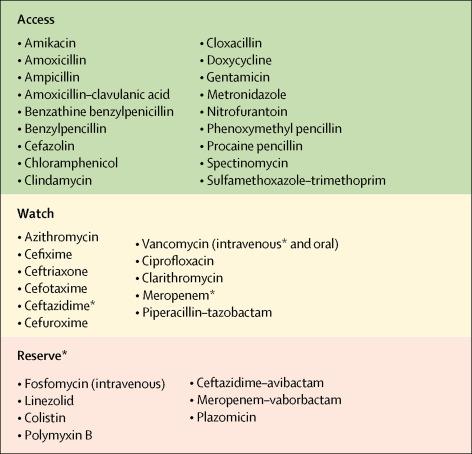当前位置:
X-MOL 学术
›
Lancet Infect Dis
›
论文详情
Our official English website, www.x-mol.net, welcomes your
feedback! (Note: you will need to create a separate account there.)
Encouraging AWaRe-ness and discouraging inappropriate antibiotic use—the new 2019 Essential Medicines List becomes a global antibiotic stewardship tool
The Lancet Infectious Diseases ( IF 36.4 ) Pub Date : 2019-11-27 , DOI: 10.1016/s1473-3099(19)30532-8 Mike Sharland 1 , Sumanth Gandra 2 , Benedikt Huttner 3 , Lorenzo Moja 4 , Celine Pulcini 5 , Mei Zeng 6 , Marc Mendelson 7 , Bernadette Cappello 4 , Graham Cooke 8 , Nicola Magrini 4 ,
The Lancet Infectious Diseases ( IF 36.4 ) Pub Date : 2019-11-27 , DOI: 10.1016/s1473-3099(19)30532-8 Mike Sharland 1 , Sumanth Gandra 2 , Benedikt Huttner 3 , Lorenzo Moja 4 , Celine Pulcini 5 , Mei Zeng 6 , Marc Mendelson 7 , Bernadette Cappello 4 , Graham Cooke 8 , Nicola Magrini 4 ,
Affiliation

|
WHO's Essential Medicines List (EML) in 2017 provided guidance on antibiotic use for common clinical infections and classified the included antibiotics into Access, Watch, and Reserve (AWaRe) groups. Antibiotics in the Access and Watch groups were selected on the basis of their indication as first-choice or second-choice treatments, spectrum of activity, and potential for inducing antimicrobial resistance, whereas Reserve antibiotics were selected as last-resource treatments for multidrug-resistant infections. The AWaRe categorisation was designed as a simple policy tool to classify the most used antibiotics globally for stewardship and surveillance purposes. However, 2017 AWaRe groups did not include some widely prescribed antibiotics, creating a large “Others or unclassified” group. This classification limits studies of antibiotic consumption as shown in a 2018 WHO report and a 2019 study that investigated the use of paediatric antibiotics per AWaRe group in 70 countries. In 2019, the EML Committee clearly distinguished between the need to continue to include essential antibiotics in the EML and the need to classify most antibiotics used globally into AWaRe groups.
中文翻译:

鼓励认识并阻止抗生素的不当使用——新的 2019 年基本药物清单成为全球抗生素管理工具
2017 年世卫组织基本药物清单 (EML) 为常见临床感染的抗生素使用提供了指导,并将所含抗生素分为使用、观察和储备 (AWaRe) 组。使用组和观察组中的抗生素是根据其作为首选或第二选择治疗的适应症、活性谱以及诱导抗菌素耐药性的潜力来选择的,而储备抗生素则被选为多重耐药性的最后资源治疗感染。 AWaRe 分类被设计为一种简单的政策工具,用于对全球最常用的抗生素进行分类,以用于管理和监测目的。然而,2017 年 AWaRe 组并未包括一些广泛使用的抗生素,从而创建了一个大型“其他或未分类”组。这种分类限制了抗生素消费的研究,如 2018 年世界卫生组织报告和 2019 年研究所示,该研究调查了 70 个国家每个 AWaRe 群体的儿科抗生素使用情况。 2019 年,EML 委员会明确区分了继续将基本抗生素纳入 EML 的需要和将全球使用的大多数抗生素分为 AWaRe 组的需要。
更新日期:2019-11-27
中文翻译:

鼓励认识并阻止抗生素的不当使用——新的 2019 年基本药物清单成为全球抗生素管理工具
2017 年世卫组织基本药物清单 (EML) 为常见临床感染的抗生素使用提供了指导,并将所含抗生素分为使用、观察和储备 (AWaRe) 组。使用组和观察组中的抗生素是根据其作为首选或第二选择治疗的适应症、活性谱以及诱导抗菌素耐药性的潜力来选择的,而储备抗生素则被选为多重耐药性的最后资源治疗感染。 AWaRe 分类被设计为一种简单的政策工具,用于对全球最常用的抗生素进行分类,以用于管理和监测目的。然而,2017 年 AWaRe 组并未包括一些广泛使用的抗生素,从而创建了一个大型“其他或未分类”组。这种分类限制了抗生素消费的研究,如 2018 年世界卫生组织报告和 2019 年研究所示,该研究调查了 70 个国家每个 AWaRe 群体的儿科抗生素使用情况。 2019 年,EML 委员会明确区分了继续将基本抗生素纳入 EML 的需要和将全球使用的大多数抗生素分为 AWaRe 组的需要。





















































 京公网安备 11010802027423号
京公网安备 11010802027423号